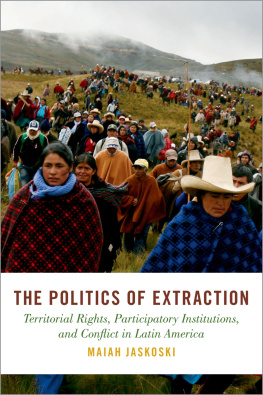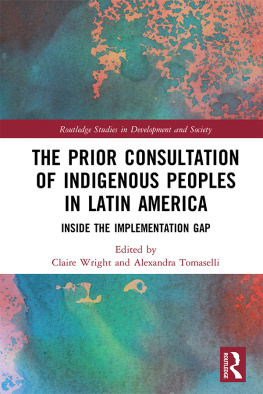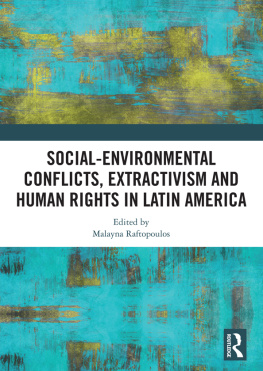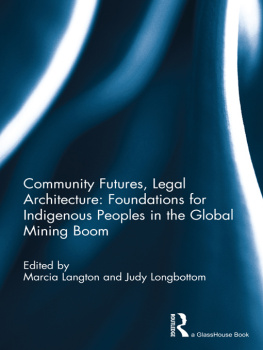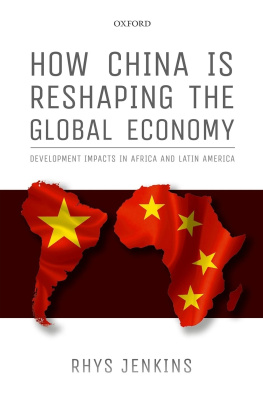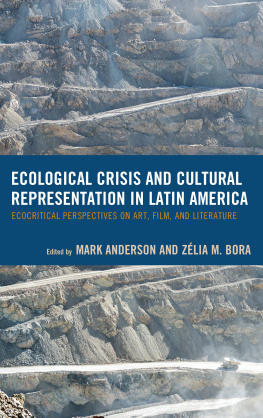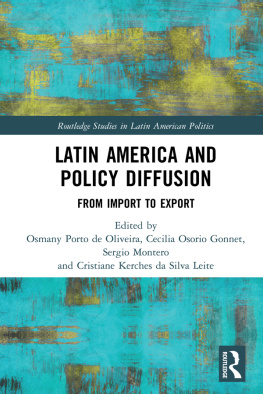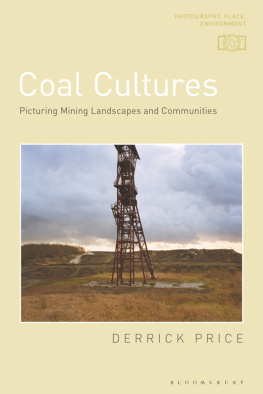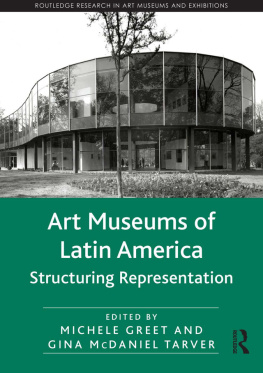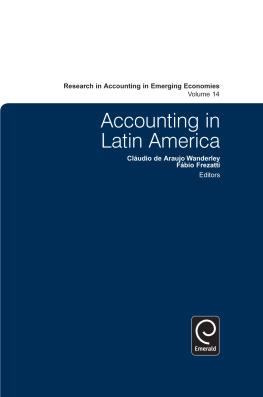The Politics of Extraction
Studies in Comparative Energy and Environmental Politics
Series editors: Todd A. Eisenstadt, American University, and Joanna I. Lewis,
Georgetown University
A Good Life on a Finite Earth: The Political Economy of Green Growth
Daniel J. Fiorino
Democracy in the Woods: Environmental Conservation and Social Justice in India, Tanzania, and Mexico
Prakash Kashwan
Who Speaks for Nature? Indigenous Movements, Public Opinion, and the Petro-State in Ecuador
Todd A. Eisenstadt and Karleen Jones West

Oxford University Press is a department of the University of Oxford. It furthers the Universitys objective of excellence in research, scholarship, and education by publishing worldwide. Oxford is a registered trade mark of Oxford University Press in the UK and certain other countries.
Published in the United States of America by Oxford University Press
198 Madison Avenue, New York, NY 10016, United States of America.
Oxford University Press 2022
All rights reserved. No part of this publication may be reproduced, stored in a retrieval system, or transmitted, in any form or by any means, without the prior permission in writing of Oxford University Press, or as expressly permitted by law, by license, or under terms agreed with the appropriate reproduction rights organization. Inquiries concerning reproduction outside the scope of the above should be sent to the Rights Department, Oxford University Press, at the address above.
You must not circulate this work in any other form and you must impose this same condition on any acquirer.
Library of Congress Cataloging-in-Publication Data
Names: Jaskoski, Maiah, 1977- author.
Title: The politics of extraction : territorial rights, participatory
institutions, and conflict in Latin America / Maiah Jaskoski.
Description: 1 Edition. | New York, NY : Oxford University Press, [2022] |
Series: Studies compar energy environ pol series |
Includes bibliographical references and index.
Identifiers: LCCN 2022000769 (print) | LCCN 2022000770 (ebook) |
ISBN 9780197568927 (hardback) | ISBN 9780197568941 (epub)
Subjects: LCSH: Mineral industriesPolitical aspectsLatin America. |
Political participationLatin America. | CommunitiesLatin America.
Classification: LCC HD9506.L292 J37 2022 (print) | LCC HD9506.L292
(ebook) | DDC 338.2098dc23/eng/20220304
LC record available at https://lccn.loc.gov/2022000769
LC ebook record available at https://lccn.loc.gov/2022000770
DOI: 10.1093/oso/9780197568927.001.0001
For Jacob and Sam
Contents
This research began with exploratory fieldwork that I carried out in Lima in 2012 on mining conflict. During that visit, I became aware of how powerfully the environmental impact study, including participation built into it, structured conflict over new extractionoften in ways not planned or desired by state or company actors.
I am indebted to the individuals in Bolivia, Colombia, and Peru who generously gave me their time and shared with me their knowledge for this study. Many of them spoke with me at length, multiple times, to orient me and put me in contact with other experts. In Peru I received guidance from Jacqueline Fowks, Carlos Monge, Maritza Paredes, Cynthia Sanborn, Martin Scurrah, and John Youle Sr. In Colombia, I benefited from the help of Julio Fierro, Juan Diego Prieto, Gloria Amparo Rodrguez, Diana Rodrguez-Franco, and Yamile Salinas Abdala. Elizabeth Huanca, Jos Martnez, Patricia Molina, and Wilfredo Plata Quispe met with me during my fieldwork in Bolivia. Carla Alberti, Matt Amengual, Denise Humphreys Bebbington, Benjamin Dangl, Bret Gustafson, Derrick Hindery, Andrea Marston, and Tom Perreault helped me prepare for fieldwork in Bolivia, through conversations and correspondence.
Numerous colleagues provided insightful suggestions on the project as it evolved, in many cases through detailed comments on draft portions of the research: Arun Agrawal, Felipe Agero, Michal Aklin, Carla Alberti, Moiss Arce, Javiera Barandiarn, Naazneen Barma, Tony Bebbington, Pal Cisneros, Gonzalo Delamaza, Tasha Fairfield, Tulia Falleti, Riccarda Flemmer, Candelaria Garay, Maria-Therese Gustafsson, Veronica Herrera, Kathy Hochstetler, Tony Lucero, Juan Pablo Luna, Lindsay Mayka, John-Andrew McNeish, Stephanie McNulty, Eduardo Moncada, Franoise Montambeault, Martin Papillon, Maritza Paredes, Juan Diego Prieto, Jessica Rich, Thea Riofrancos, Mara Paula Saffon, Almut Schilling-Vacaflor, Bettina Schorr, Eduardo Silva, Carie Steele, and Stephen Wright. Todd Eisenstadt, Cynthia McClintock, and two anonymous reviewers through Oxford University Press read and provided indispensable feedback on the full book manuscript. Kent Eaton saw the research as a book project long before I did. I am thankful for his feedback on the research throughout its evolution.
I received research assistance from Sara Caicedo and Nathan Edenhofer, who compiled parts of the conflict timelines for the Afrodita, Block 116, Conga, Gasoducto del Sur, and Ta Mara cases. Diego Esparza assisted with gathering secondary sources in Colombia. Yu Cao, Joseph Chirwa, Alena Gross, Mara Pfeffer, and Kassidy Sanders provided editorial assistance.
I had wonderful opportunities, by the invitation of colleagues, to present and receive invaluable comments on different phases of the research, at the Pontifical Catholic University of Chile, the University of Los Lagos, and the University of Montreal. Conversations during those events helped me clarify further the books argument.
I thank Angela Chnapko, my editor at Oxford University Press, and the editors of the Studies in Comparative Energy and Environmental Politics series, Todd Eisenstadt and Joanna Lewis, for their enthusiasm for the project. I appreciate the excellent work of Alexcee Bechthold and the rest of the Oxford production team.
I received support for this research in the form of multiple grants through Northern Arizona University and the US Department of Defense Threat Reduction Agency Advanced Systems and Concepts Office. Portions of the research are published, as Environmental Licensing and Conflict in Perus Mining Sector: A Path-Dependent Analysis, World Development 64 (December 2014): 873883; Participatory Institutions as a Focal Point for Mobilizing: Prior Consultation and Indigenous Conflict in Colombias Extractive Industries, Comparative Politics 52, no. 4 (July 2020): 537556; and Conflicto y estrategia social en la minera y los hidrocarburos peruanos: Los usos variados de la participacin en la evaluacin de impacto ambiental, Revista de Ciencia Poltica 41, no. 3 (December 2021): 587609.
From early drafts of conflict analyses, to the sorting of the conflicts across chapters, and continuing through the final revisions, I kept one book on hand to serve as a model for medium-n analysis using qualitative case studies: Ruth Berins Colliers Paths Toward Democracy: The Working Class and Elites in Western Europe and South America.
Finally, I am grateful to my family for their support. My husband John and our sons Sam and Jacob embraced the project as something that would develop alongside the other facets of our lives. They accompanied me to Colombia one summer for research, tolerated my absence during other research trips, and accepted without complaint many months of final revisions.

